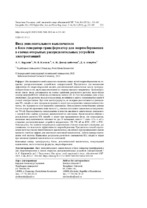Ввод дополнительного выключателя в блок генератор-трансформатор для энергосбережения в схемах открытых распределительных устройств электростанций

Date
2023Publisher
Another Title
Introduction of an Auxiliary Breaker into the Generator-Transformer Block for Energy Saving in Open Switchgear Circuits of Power Plants
Bibliographic entry
Ввод дополнительного выключателя в блок генератор-трансформатор для энергосбережения в схемах открытых распределительных устройств электростанций = Introduction of an Auxiliary Breaker into the Generator-Transformer Block for Energy Saving in Open Switchgear Circuits of Power Plants / А. С. Барукин [и др.] // Известия высших учебных заведений и энергетических объединений СНГ. Энергетика. – 2023. – № 4. – С. 333-343.
Abstract
Обосновывается необходимость отыскания новых путей энергосбережения на открытых распределительных устройствах электростанций. Предлагается для повышения эффективности энергосбережения вводить дополнительный выключатель между трансформатором блока и его двумя выключателями со стороны высшего напряжения. Целесообразность такого ввода доказывается на основе сравнения результатов расчетов недоотпуска электроэнергии (НЭ) по таблично-логическому методу (Ю. Б. Гук) полученных схем и традиционных. Для расчетов исследуются режимы, возникшие в связи с изменившейся главной схемой электростанции. При этом даются формулы, по которым рассчитываются уменьшения НЭ, ущерба от него при реконструкции и затрат при сооружении электростанции (считается, что издержки во всех вариантах одинаковы). Используются статистические данные России и спрогнозированная нами частота эв отказов элегазового выключателя напряжением 750 кВ. Рассматривается использование в качестве вводимого выключателя элегазового с заменой и без замены остальных выключателей на элегазовые. Представляется таблица с результатами расчетов НЭ, ущерба и затрат при предлагаемом вводе, где определяется, насколько ввод выключателя изменяет их для 18 кольцевых схем и 17 схем «3/2» и «4/3» открытых распределительных устройств напряжением 330–750 кВ на КЭС, АЭС и ГЭС. Показывается, что наличие генераторного выключателя в блоках позволяет в несколько раз уменьшить эти показатели эффективности энергосбережения. Предлагается способ определения частоты отказов гипотетического выключателя, способного при традиционной замене принести такой же эффект, как вводимый элегазовый выключатель. Дается пример определения этой частоты. Приводятся результаты расчетного уменьшения НЭ, ущерба и затрат при замене воздушного выключателя на элегазовый.
Abstract in another language
A need in finding of new ways of energy saving at open switchgears of power plants is substantiated. In order to increase energy saving efficiency, an auxiliary breaker is suggested to be inserted between a transformer of a block and its two high-voltage circuit breakers. The reasonability of such an insertion is proved on the basis of comparing of calculations results of under-discharge of electricity (UE) by the tabular-logical method (Yu. B. Guk) of the obtained schemes and of the traditional ones. For the calculations, the conditions that arose due to the change in the main circuit of a power plant are studied. Also, equations are given for calculation of a decrease in UE, damage due to it during reconstruction, and costs for the construction of a power plant (the costs are assumed to be the same in all options). Russian statistical data and the predicted failure rate λEV of a 750 kV SF6 circuit breaker are used. An option of the introduction of an SF6 circuit breaker with and without replacement of other circuit breakers with SF6 circuit breakers is considered. The results of calculations of UE, damage, and costs for the introduction suggested are tabulated, where changes in them due to the introduction of the circuit breaker are estimated for 18 ring circuits and 17 “3/2” and “4/3” circuits of 330–750 kV switchgears at condensation, nuclear, and hydroelectric power plants. It is demonstrated that the presence of a generator breaker in the blocks makes it possible to reduce these energy-saving efficiency indicators several times. A technique for determining the failure rate of a hypothetical circuit breaker, which, in the case of traditional replacement, is capable of producing the same effect as an SF6 circuit breaker inserted is proposed. An example of determining this frequency is given. Results of the calculated reduction of UE, damage and costs for the case of an air circuit breaker having been substituted to an SF6 circuit breaker are presented.
View/
Collections
- № 4[7]
